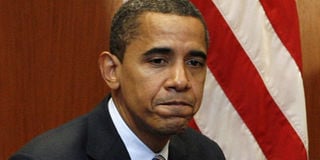Obama urged to make genocide prevention a priority

U.S. President-elect Barack Obama talks to the media in his transition office in Chicago on Tuesday. REUTERS
UNITED NATIONS, Wednesday (Reuters) - A high-level U.S. taskforce on preventing genocide said on Tuesday it expected President-elect Barack Obama to support its call for a $250 million fund to back emergency action in high-risk countries.
The Genocide Prevention Task Force, co-chaired by former Secretary of State Madeleine Albright and former Secretary of Defense William Cohen, issued a report this week calling for prevention of genocide to be a top priority in the new U.S. administration that will take office in January.
Albright told reporters at the United Nations on Tuesday the United States should not bear the burden alone but should lead the way in taking responsibility to prevent mass atrocities and genocide wherever they may happen.
She called for the creation of a high level inter-agency mechanism to coordinate between various branches of the U.S. government to focus on early warning when the first signs of a problem occur. That should be backed by $250 million a year to finance specially tailored projects in countries at risk.
"This modest fund would give U.S. diplomats a potentially pivotal tool with which to avert catastrophe," Albright said.
Albright, who was secretary of state under U.S. President Bill Clinton, said the report was prepared with input from many people involved in Obama's transition team.
Cohen said the 34 recommendations in the report aimed to create the mechanisms to ensure early detection and preventative action to stop genocide before it was too late, retaining the option of military action as a last resort.
"We believe that president-elect Obama will support it, we don't know that for certain but we believe that to be the case," Cohen said.
Albright was U.S. ambassador to the United Nations during the Rwandan genocide in 1994. She said the report by the taskforce was not a historical analysis but it did take account of lessons learned when the international community failed to stop the slaughter of some 800,000 people in Rwanda.
"There's broad range of foreign policy options between standing aside and ordering in the Marines," Albright said, emphasizing the importance of early warning systems and international cooperation to exert diplomatic pressure.
Cohen said it was vital that the United States not appear to be "meddling" in a unilateral way.
He said preventing genocide was in the national security interest of all countries, since it could lead to failed states with the potential to breed terrorism.


